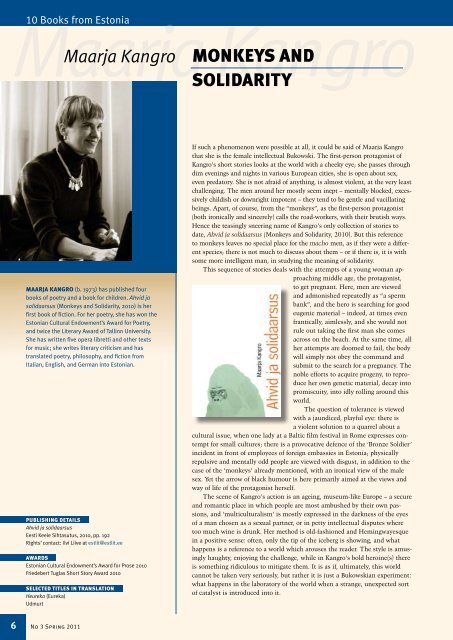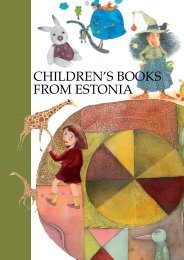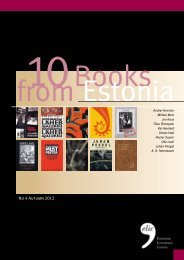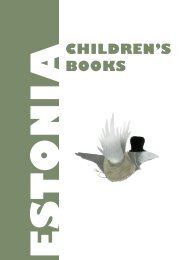No 3 Spring 2011 - Estonian Literature
No 3 Spring 2011 - Estonian Literature
No 3 Spring 2011 - Estonian Literature
You also want an ePaper? Increase the reach of your titles
YUMPU automatically turns print PDFs into web optimized ePapers that Google loves.
10 Books from Estonia<br />
Maarja Kangro<br />
Maarja Kangro MONKeys aNd<br />
6<br />
MaarJa KaNGrO (b. 1973) has published four<br />
books of poetry and a book for children. Ahvid ja<br />
solidaarsus (Monkeys and Solidarity, 2010) is her<br />
first book of fiction. For her poetry, she has won the<br />
<strong>Estonian</strong> Cultural Endowment’s Award for Poetry,<br />
and twice the Literary Award of Tallinn University.<br />
She has written five opera libretti and other texts<br />
for music; she writes literary criticism and has<br />
translated poetry, philosophy, and fiction from<br />
Italian, English, and German into <strong>Estonian</strong>.<br />
PUbLishiNG deTaiLs<br />
Ahvid ja solidaarsus<br />
Eesti Keele Sihtasutus, 2010, pp. 192<br />
Rights’ contact: Ilvi Liive at estlit@estlit.ee<br />
awards<br />
<strong>Estonian</strong> Cultural Endowment’s Award for Prose 2010<br />
Friedebert Tuglas Short Story Award 2010<br />
seLecTed TiTLes iN TraNsLaTiON<br />
Heureka (Eureka)<br />
Udmurt<br />
<strong>No</strong> 3 <strong>Spring</strong> <strong>2011</strong><br />
sOLidariTy<br />
If such a phenomenon were possible at all, it could be said of Maarja Kangro<br />
that she is the female intellectual Bukowski. The first-person protagonist of<br />
Kangro’s short stories looks at the world with a cheeky eye; she passes through<br />
dim evenings and nights in various European cities, she is open about sex,<br />
even predatory. She is not afraid of anything, is almost violent, at the very least<br />
challenging. The men around her mostly seem inept – mentally blocked, excessively<br />
childish or downright impotent – they tend to be gentle and vacillating<br />
beings. Apart, of course, from the “monkeys”, as the first-person protagonist<br />
(both ironically and sincerely) calls the road-workers, with their brutish ways.<br />
Hence the teasingly sneering name of Kangro’s only collection of stories to<br />
date, Ahvid ja solidaarsus (Monkeys and Solidarity, 2010). But this reference<br />
to monkeys leaves no special place for the macho men, as if they were a different<br />
species; there is not much to discuss about them – or if there is, it is with<br />
some more intelligent man, in studying the meaning of solidarity.<br />
This sequence of stories deals with the attempts of a young woman approaching<br />
middle age, the protagonist,<br />
to get pregnant. Here, men are viewed<br />
and admonished repeatedly as “a sperm<br />
bank”, and the hero is searching for good<br />
eugenic material – indeed, at times even<br />
frantically, aimlessly, and she would not<br />
rule out taking the first man she comes<br />
across on the beach. At the same time, all<br />
her attempts are doomed to fail, the body<br />
will simply not obey the command and<br />
submit to the search for a pregnancy. The<br />
noble efforts to acquire progeny, to reproduce<br />
her own genetic material, decay into<br />
promiscuity, into idly rolling around this<br />
world.<br />
The question of tolerance is viewed<br />
with a jaundiced, playful eye: there is<br />
a violent solution to a quarrel about a<br />
cultural issue, when one lady at a Baltic film festival in Rome expresses contempt<br />
for small cultures; there is a provocative defence of the ‘Bronze Soldier’<br />
incident in front of employees of foreign embassies in Estonia; physically<br />
repulsive and mentally odd people are viewed with disgust, in addition to the<br />
case of the ‘monkeys’ already mentioned, with an ironical view of the male<br />
sex. Yet the arrow of black humour is here primarily aimed at the views and<br />
way of life of the protagonist herself.<br />
The scene of Kangro’s action is an ageing, museum-like Europe – a secure<br />
and romantic place in which people are most ambushed by their own passions,<br />
and ‘multiculturalism’ is mostly expressed in the darkness of the eyes<br />
of a man chosen as a sexual partner, or in petty intellectual disputes where<br />
too much wine is drunk. Her method is old-fashioned and Hemingwayesque<br />
in a positive sense: often, only the tip of the iceberg is showing, and what<br />
happens is a reference to a world which arouses the reader. The style is amusingly<br />
haughty, enjoying the challenge, while in Kangro’s bold heroine(s) there<br />
is something ridiculous to mitigate them. It is as if, ultimately, this world<br />
cannot be taken very seriously, but rather it is just a Bukowskian experiment:<br />
what happens in the laboratory of the world when a strange, unexpected sort<br />
of catalyst is introduced into it.







